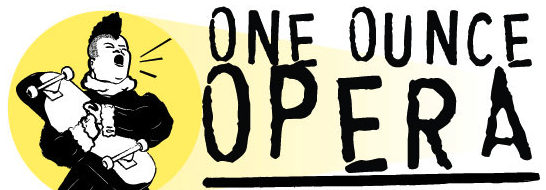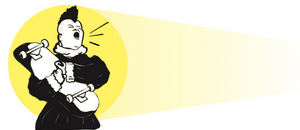It is November 25th, 2014. We are in the video game section of a chic toy store in New York City. We meet a thirteen-year-old boy and his dad’s girlfriend. What happens next is…Ho! Ho! Ho!, written by composer Peter von der Nahmer and librettist Kate Chadwick, premiered at the Hartford Opera Theater in 2015. OOO is proud to present its Texas premiere.
We asked for more insight into the piece. Here is Peter’s response:
Peter: Kate and I have worked on several short music theater pieces that all carry the common nominator of understanding and reaching out in the deepest parts of what makes us who we are and how we approach the world.
My biggest inspiration for every new piece is always a long conversation with the writer about the piece, the characters and the story itself. It is in this very moment when reading a text that three possible things might happen.
- I get immediately a sense for what the musical world needs to be, not what I want it to be.
- I don’t hear any music or all. Which might be that the text is written in way that doesn’t really call to be musicalized or simply I feel that the piece itself wants to be everything else but a music theater piece.
- I am excited about both the story, the characters and how the language is represented but I feel that the music is in a different musical area/genre/style that I need to learn before starting to work on it. This is normally the moment when I am most excited about a new piece because it means that this piece is a new venture for myself, something to unravel and discover and something new for me to learn. This is also not as simple as just saying, oh this piece uses an Rock and this is piece uses a 12 tone scale as it then might be simply a bad version of either of those styles. What I really mean with it that I want that the piece tells me what it wants musically and not me telling the piece what it has to be. This is also means that you as the creator need to have a different kind of openness and willingness – almost similar to a psychoanalyst – to let happen what needs to happen and to give in to the drama of the piece as much as you can. You need to see and feel those characters family members that you dare to ask all sorts of questions and don’t run away when you get an answer that might confuse you.
After writing numerous pieces for the stage I have also given up on trying to know or guide what I think needs to be written by my and another librettist.
Rather have I realized that it is not about what ever piece another librettist and I think could be a good new idea but asking what piece can only be written by the two of us. What makes us both special in our backgrounds and knowledge and how do these two world come together to create a unique artistic experience. Sometimes it doesn’t work because we might realize that our approaches are to different in the end but more often it might lead to new ideas for pieces that we would have never created would we have gone the „easy“ road of trying to dictate a certain project.
It requires a lot of listening to each and searching for those hidden stories that feel interesting. I think all of this comes from my life long search in trying to understand the human mind and the human condition and my idea that every person, however strange they are, might have an important message for you, that is worth listening to because you might gain a new understanding not only of the other person but also through the other person about yourself.
This is the same with HO! HO! HO! where we have two people in the very beginning we know very little about, even more we might have no clue of where this piece is actually going. It starts even musically out with a rather classical recitative, a somewhat old fashioned way of approaching a contemporary opera but it lures you in a world where things might appear safe, maybe you have the feeling of control, of knowing where things might go next, only when everything turns a sudden shift. The way to go in pieces that seem or appear comedic is always that you as writers need to take your characters very seriously. I personally don’t believe that there is any kind of music that is in itself comedic in nature. Maybe there are sounds of instruments that one mind find funny because they resemble other noises we connect with „funny“ noises but I don’t think that music in itself is funny. A comedic moment comes from how we personally experience either the connection between music and text or images or simply what we find in general funny.
In writing the music to the libretto I carefully tried to give each character enough space to develop both story and music wise. In quick dialogues I find this always very tricky because you as the composer might tend to writing a music that might simply underscore both charters.
In HO! HO! HO! I tried as much as possible to stay as individual character that have their own musical world that we get drawn into so when I am playing not only with there motives but overall sound world the audience really can get a visceral feeling of what is happening on stage and they can decide for which character they route. The idea of having a tenor voice stand in for the little boy, rather than having a boy sing the part has many reasons. First the the text and subject matter but I also think it created an interesting conflict for the audience of saying a man behave as child which in itself is more interesting and “funnier“ than having an actual child play the role.
The last thing to say about the inspiration is not so much how video games have became a problem for kids, as I think games are not a new thing any more. Even I like to play computer games from time to time.
The problem is our loss or lack of listening to each other and understanding what the other person has to say or needs at this very right moment and how we can
find a way to give each person other what we need without being disrespectful because in the end bad things might happen because all our emotions are bottled up until they explode and we say :“I’m hardly ever violent. But….“.
 Peter Michael von der Nahmer (“Mike”) is a composer and sound researcher based in New York City. His American/German/Cuban heritage influences the questions of identity, complexity, and transcendent connection that shape his music. He has written over 27 works for music theater and dance, and over 100 works for concert and film; many have received national/international awards, and been performed around the world. Most recently he was awarded the 2016 McKnight Visiting composer residency, where he will work on new musical theater pieces with the teenagers and seniors from New Ulm, MN concerning the history of the town. Mike holds a B.A. in composition from the University of Music and Performing Arts, Munich and an M.A. in Music Therapy from the University of Augsburg. He holds certificates in Film Scoring from the UCLA, and in Music Pain Treatment (music therapy treatment for patients with chronic pain) from the Magdeburg-Stendal University of Applied Sciences. In May 2015, he received an M.F.A. in Musical Theater Writing from New York University. He also studied traditional Chinese music with composer Wang Ai Qun. Beyond his formal training, he was influenced by his father, an artist and healer who was later a Hindu priest; by traditional forms of healing, fairytales and myth; and by traditional Jewish and Indian music. His work naturally connects western classical music with other musical forms. Mike’s barrier-breaking, eclectic background explains his passion for music both as artistic expression and as a means to connect disparate cultures. His desire to be an agent of radical connection – to literally create harmony out of apparent dissonance – is his defining motivation. Find out more about Peter Michael on his website, www.petermichaelvondernahmer.com
Peter Michael von der Nahmer (“Mike”) is a composer and sound researcher based in New York City. His American/German/Cuban heritage influences the questions of identity, complexity, and transcendent connection that shape his music. He has written over 27 works for music theater and dance, and over 100 works for concert and film; many have received national/international awards, and been performed around the world. Most recently he was awarded the 2016 McKnight Visiting composer residency, where he will work on new musical theater pieces with the teenagers and seniors from New Ulm, MN concerning the history of the town. Mike holds a B.A. in composition from the University of Music and Performing Arts, Munich and an M.A. in Music Therapy from the University of Augsburg. He holds certificates in Film Scoring from the UCLA, and in Music Pain Treatment (music therapy treatment for patients with chronic pain) from the Magdeburg-Stendal University of Applied Sciences. In May 2015, he received an M.F.A. in Musical Theater Writing from New York University. He also studied traditional Chinese music with composer Wang Ai Qun. Beyond his formal training, he was influenced by his father, an artist and healer who was later a Hindu priest; by traditional forms of healing, fairytales and myth; and by traditional Jewish and Indian music. His work naturally connects western classical music with other musical forms. Mike’s barrier-breaking, eclectic background explains his passion for music both as artistic expression and as a means to connect disparate cultures. His desire to be an agent of radical connection – to literally create harmony out of apparent dissonance – is his defining motivation. Find out more about Peter Michael on his website, www.petermichaelvondernahmer.com

Kate Chadwick (librettist) grew up in ballet, taking classes, participating in summer intensive programs, and performing all through childhood. She has a BA (high-honors in musical theatre) from the University of California, Irvine, and a post-graduate degree from The Oxford School of Drama. After school, she performed lead roles in regional theatre productions in the US and the UK (leads in Guys and Dolls, The Music Man, The Sound of Music, My Fair Lady, Brigadoon, Sweeney Todd). She graduated from NYU’s Graduate Musical Theatre Writing Program in May 2015, and had a showcase of her songs in the Mr. Finn’s Cabaret series at Barrington Stage in July of 2015. She will have a reading of her show Butterflies at Barrington Stage in the summer of 2017, directed by Graciela Daniele, and has had songs performed in cabarets around New York City (The Laurie Beechman Theatre, 54 Below, Sardi’s). www.katechadwick.com

